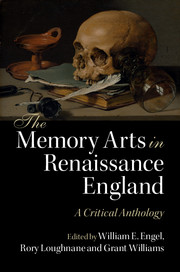Book contents
- Frontmatter
- Dedication
- Contents
- List of figures
- Acknowledgements
- A note on abbreviations
- Introduction
- PART I The art of memory
- PART II Rhetoric and poetics
- PART III Education and science
- PART IV History and philosophy
- PART V Religion and devotion
- Introduction to Part V
- V.1 Thomas More, A Treatise (Unfinished) upon these Words of Holy Scripture (1522)
- V.2 John Foxe, Acts and Monuments (1563)
- V.3 Thomas Playfere, The Pathway to Perfection (1593)
- V.4 Joseph Hall, selected works
- V.5 Richard Day, A Book of Christian Prayers (1608)
- V.6 Daniel Featley, ‘Four Rows of Precious Stones’ (1610)
- V.7 Lewis Bayly, The Practice of Piety (1613)
- V.8 John Donne, ‘Sermon, preached at Lincoln's Inn’ (1649)
- V.9 Stephen Jerome, A Minister's Mite (1650)
- V.10 E.M., Ashrea (1665)
- PART VI Literature
- Index
- References
V.1 - Thomas More, A Treatise (Unfinished) upon these Words of Holy Scripture (1522)
from PART V - Religion and devotion
Published online by Cambridge University Press: 05 August 2016
- Frontmatter
- Dedication
- Contents
- List of figures
- Acknowledgements
- A note on abbreviations
- Introduction
- PART I The art of memory
- PART II Rhetoric and poetics
- PART III Education and science
- PART IV History and philosophy
- PART V Religion and devotion
- Introduction to Part V
- V.1 Thomas More, A Treatise (Unfinished) upon these Words of Holy Scripture (1522)
- V.2 John Foxe, Acts and Monuments (1563)
- V.3 Thomas Playfere, The Pathway to Perfection (1593)
- V.4 Joseph Hall, selected works
- V.5 Richard Day, A Book of Christian Prayers (1608)
- V.6 Daniel Featley, ‘Four Rows of Precious Stones’ (1610)
- V.7 Lewis Bayly, The Practice of Piety (1613)
- V.8 John Donne, ‘Sermon, preached at Lincoln's Inn’ (1649)
- V.9 Stephen Jerome, A Minister's Mite (1650)
- V.10 E.M., Ashrea (1665)
- PART VI Literature
- Index
- References
Summary
About the author
Thomas More (1478–1535), lawyer, under-sheriff of London, hunter of heretics, Lord Chancellor, martyr and saint, canonically known for writing the prototype for utopian fiction. He held several civic and court positions and composed various literary, spiritual and polemical works befitting an intellectual who fraternised with leading European Renaissance humanists.
About the text
The treatise apparently is the outcome of a meditative exercise that More and his daughter Margaret, embarked upon, taking as the starting point of their separate treatments Ecclesiasticus 7:40: ‘Remember the last things and thou shalt never sin.’ Thought to be written in 1522, the transition between More's humanistic and polemical periods, the text may have been partially motivated by the Duke of Buckingham's sudden downfall in Henry VIII's court. Its extensive and rather elaborate design promised to contemplate the ways in which each of the four last things (death, doom, pain and joy) would enable the reader to fend off each of the seven deadly sins (pride, envy, wrath, covetousness, gluttony, sloth and lechery). The treatise, however, remains unfinished, terminating at the first last thing only and its relationship to the first six sins. More demonstrates a rich working knowledge of the traditions, practices and iconography of penitence, contemptus mundi, danse macabre, ars moriendi and the seven deadly sins.
The arts of memory
Turning to medical discourse, More conceives of the Ecclesiasticus quotation as a religious prescription for the sickness of sin. Remembering thus becomes a therapeutic action of dealing with wayward interiority. It accomplishes this remedy through recalibrating the subject's economy of pleasure from the fleshly to the spiritual. In this excerpt, More encourages readers to practise a profounder memory art, one that stimulates the imagination, personalises the imagery of death and roots it deep within the individual's heart.
Textual notes
The Workes of Sir Thomas More Knyght, sometyme Lorde Chancellour of England (London, 1557), E7r.
Treatise (Unfinished) upon these Words of Holy Scripture
For nothing is there that may more effectually withdraw the soul from the wretched affections of the body than may the remembrance of death, if we do not remember it hourly, as one heareth a word and let it pass by his ear without any receiving of the sentence into his heart.
- Type
- Chapter
- Information
- The Memory Arts in Renaissance EnglandA Critical Anthology, pp. 233 - 235Publisher: Cambridge University PressPrint publication year: 2016



